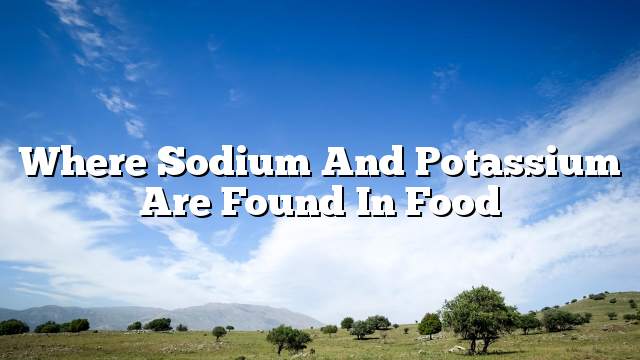Sodium and potassium
The human body, by nature, needs many nutrients to be able to carry out its activities and vital processes. One of the most important elements is sodium and potassium. In the process of defending the health of the body, there is an effective element to carry out this task, namely potassium. It is sodium or so-called salt food. The most important vital processes that these elements organize are:
Their importance
- Regulate the level of pressure for human blood.
- Regulate the water balance of the body between its internal and external environment as well.
- Organize food transfer through cell membranes.
- Electrochemical pulse transmission assistance.
The effect of their increase in the body
In order for the biological processes to take place within the body properly, there must be a balance in the food we eat from sodium and potassium. If we eat sodium in a large way, this leads to problems and health diseases,
- high blood pressure.
- brain attack.
- Different heart diseases, specifically coronary.
- Kidney disease.
- stomach cancer.
- Irregular heartbeat coupled with weakness in the muscles of the body.
- As for potassium, you can eat more, because it helps to reduce blood pressure, by eating a variety of foods, which in turn contain potassium in large quantities, including:
Foods rich in potassium
- Dried fruits are the most important: raisins, dates, figs, bananas, oats and apricots.
- Vegetables: potatoes, avocados, beets, spinach, squash, cauliflower and tomatoes.
- Juices: such as orange juice, peach, apple and grapefruit.
- Whole grains, including whole wheat bread, wheat bran, bran flakes, and cornflakes.
Foods rich in sodium
- Seafood like fish, lobster and shrimp.
- Salt and fruits are general.
- Dairy and its products of brick, cheese, butter and milk.
- Vegetables include: cabbage, eggplant, pepper, potatoes, tomatoes, dandelion, mustard, green turnip, spinach, artichoke and spinach.
Get them in a balanced way
But if we eat potassium but a little, this leads to the exposure to kidney stones in addition to osteoporosis, so there must be steps to be followed to make a balance between them and summarize our need for sodium is as follows:
- An adult, who is healthy, is estimated to need 2,300 mg of sodium.
- The human need for high blood pressure is estimated to be around 1,500 mg of sodium.
Therefore, when preparing for food or even shopping, it is recommended to follow the following in order to control the amount of sodium in foods and avoid diseases, namely:
- Choose fresh food, but if you use canned foods, choose low-sodium foods, and if they are high, wash them thoroughly before use.
- Use cheese, butter and other milk to be unsalted.
- You can use spices instead of adding salt, for example.
- Foods with low sodium content include: peppers, legumes, carrots, radishes, sweet potatoes, cabbage, onions, tomatoes, cucumbers, eggplants, garlic and others.
